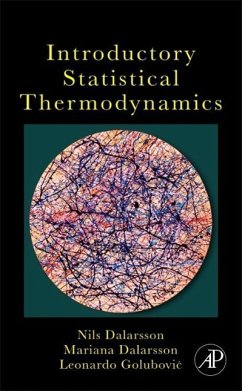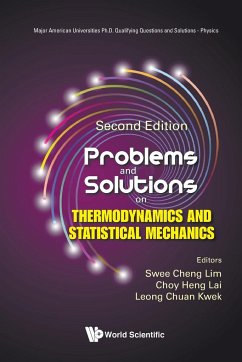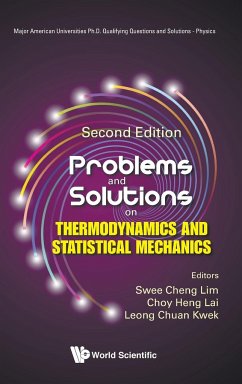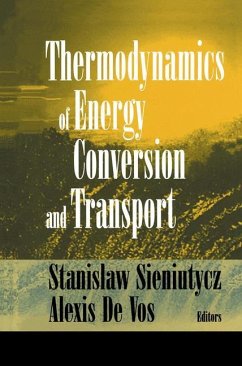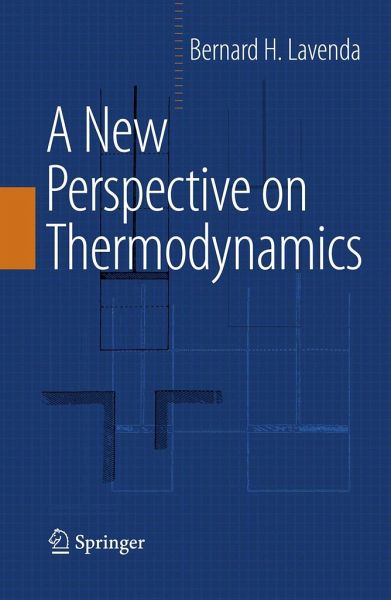
A New Perspective on Thermodynamics
Versandkostenfrei!
Versandfertig in 6-10 Tagen
76,99 €
inkl. MwSt.
Weitere Ausgaben:

PAYBACK Punkte
38 °P sammeln!
This text combines an old look at thermodynamics with a new foundation. A New Perspective on Thermodynamics can be considered a new edition of P.G. Tait's book, which profoundly impacted generations of thermodynamicists. The book will present a historical perspective which unravels the current presentation of thermodynamics found in standard textbooks, and which emphasizes the fundamental role that Carnot played in the development of thermodynamics. Conceptual flaws in timely topics, such as endoreversible engines, finite-time thermodynamics, and single-molecule measurements which use equilibrium changes in the free energy to determine nonequilibrium work, are highlighted.
The book introduces a new outlook on thermodynamics, showing that it was not formulated as a series of laws, like those of Newton, but, rather, as the desire to account for the effects of heat on otherwise mechanical systems, and the possible overlap of the interpretations of first and second laws. In fact, the historical development shows that there is no clear-cut distinction between the first and second laws; irreversibility can be characterized by an increase in entropy or a diminution in the internal energy. Notwithstanding this, it is Clausius's approach which is almost universally adhered to. An approach to the development of non-Carnot efficiencies is given, and how it can be used in modern contexts. Critiques are given on finite-time thermodynamics, non-Carnot cycles, single molecule experiments that equate non-equilibrium work with equilibrium free energy chains.
The book introduces a new outlook on thermodynamics, showing that it was not formulated as a series of laws, like those of Newton, but, rather, as the desire to account for the effects of heat on otherwise mechanical systems, and the possible overlap of the interpretations of first and second laws. In fact, the historical development shows that there is no clear-cut distinction between the first and second laws; irreversibility can be characterized by an increase in entropy or a diminution in the internal energy. Notwithstanding this, it is Clausius's approach which is almost universally adhered to. An approach to the development of non-Carnot efficiencies is given, and how it can be used in modern contexts. Critiques are given on finite-time thermodynamics, non-Carnot cycles, single molecule experiments that equate non-equilibrium work with equilibrium free energy chains.
Dr. Bernard H. Lavenda has written A New Perspective on Thermodynamics to combine an old look at thermodynamics with a new foundation. The book presents a historical perspective, which unravels the current presentation of thermodynamics found in standard texts, and which emphasizes the fundamental role that Carnot played in the development of thermodynamics.
A New Perspective on Thermodynamics will:
Chronologically unravel the development of the principles of thermodynamics and how they were conceived by their discoverers
Bring the theory of thermodynamics up to the present time and indicate areas of further development with the union of information theory and the theory of means and their inequalities. New areas include nonextensive thermodynamics, the thermodynamics of coding theory, multifractals, and strange attractors.
Reintroduce important, yet nearly forgotten, teachings of N.L. Sardi Carnot
Highlight conceptual flaws in timely topics such as endoreversible engines, finite-time thermodynamics, geometrization of thermodynamics, and nonequilibrium work from equilibrium free energy differences.
Dr. Bernard H. Lavenda is Professor of Physical Chemistry at Universita degli Studi di Camerino, Italy. He is recipient of the 2009 Telesio-Galeli Prize in Physics for his work on irreversible thermodynamics.
A New Perspective on Thermodynamics will:
Chronologically unravel the development of the principles of thermodynamics and how they were conceived by their discoverers
Bring the theory of thermodynamics up to the present time and indicate areas of further development with the union of information theory and the theory of means and their inequalities. New areas include nonextensive thermodynamics, the thermodynamics of coding theory, multifractals, and strange attractors.
Reintroduce important, yet nearly forgotten, teachings of N.L. Sardi Carnot
Highlight conceptual flaws in timely topics such as endoreversible engines, finite-time thermodynamics, geometrization of thermodynamics, and nonequilibrium work from equilibrium free energy differences.
Dr. Bernard H. Lavenda is Professor of Physical Chemistry at Universita degli Studi di Camerino, Italy. He is recipient of the 2009 Telesio-Galeli Prize in Physics for his work on irreversible thermodynamics.





